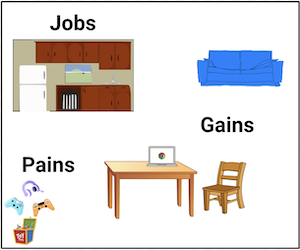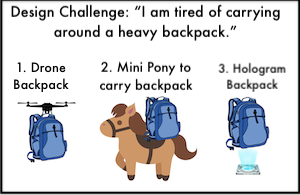(Coming Soon) Design Thinking: Reimagining a Distance Learning Space
A Cross-Curricular Unit
NGS Standards
- ETS1A: Defining and delimiting an engineering problem.
- ETS1B: Developing possible solutions.
- ETS1C: Optimizing the design solution.
ELA Standards
- W1: Write opinion pieces on topics or texts, supporting a point of view with reasons and information.
- W2: Write informative/explanatory texts to examine a topic and convey ideas and information clearly.
- W3: Write narratives to develop real or imagined experiences or events using effective technique, descriptive details, and clear event sequences.
Enduring Understanding
Students will identify a challenge and carry out the steps of the design thinking process, which includes:
- Discovery: Defining/understanding the challenge.
- Interpretation: Finding meaning and developing a point of view that will guide ideas.
- Ideation: Brainstorming and refining ideas.
- Experimentation: Prototyping and receiving feedback.
- Evolution: Presenting a deliverable and further directions
to create a potential solution to address the challenge.
Main Objective
SWBAT identify the major challenges of distance learning and carry out the design thinking process to design a physical space that addresses some of these challenges.
Phase 1
Activity Sequence
- Activity 1: Visualizing the Challenge
- Activity 2: Sharing Visualizations & Finding Themes
Link to Teacher Guide
Activity 1
Visualizing the Challenge
Objective: SWBAT visualize themselves going through a day of distance learning and describe what they visualized.

Activity 2
Objective: Students will share their distance learning pictures from the day before and identify themes that emerge in students' shared experiences.


Phase 2
Activity Sequence
- Activity 3: Defining the Design Challenge
- Activity 4: Designing without Boundaries
Link to Teacher Guide
Activity 3
Objective: Students will perform a needs assessment for their learning space--which includes:
- Identifying the jobs students need to perform in their learning space.
- Identifying the "pains" of their current learning space.
- Identifying the "gains" that would improve their learning space.

Activity 4
Objective: Students will be given a design challenge and will come up with creative design solutions, free of any restrictions.
